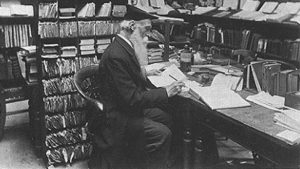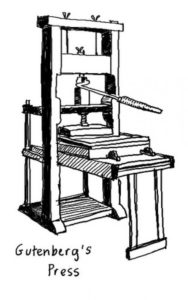
The Oxford English Dictionary (OED)
The work on the Oxford English Dictionary was published in 1879, with an original estimate that the complete four-volume set would take ten years. When it took five years to get to “ant,” the editors knew they had underestimated spectacularly — perhaps definitively, given that the OED has been in a state of perpetual addition and revision. Recent Supplements inform us, for example, that an “aliterate” is a person able to read but unwilling to do so, and that “teledildonics” is computer sex — though the mandate of the OED does not extend to suggesting a connection between the two.
Being based “on historic principles,” the OED makes it possible for others to make such connections by tracking the history and evolution of words through over 2.5 million dated quotations. Today, as originally, the general public is encouraged to submit quotations to the OED in support of their effort to find the earliest and best usages. Readers today are also asked to contribute in another way, by tracking down a long list of quotations that the OED incorporated from Samuel Johnson‘s 18th century dictionary but which have not been found and checked in their original context. Heading the OED’s “Appeals List” is this, purportedly penned by Archbishop Abbot, about 1633: “The force of it is obstupefactive, and no other.”
When James Murray, editor of the first OED, advertised around the English-speaking world for people to submit quotations, he was inundated. The fascinating story of Murray’s life and labors — a grammar school teacher and amateur philologist agreeably and determinedly toiling away for decades in his “Scriptorium” at 5.5 million slips of paper tucked in lettered pigeonholes — is told in a recent biography written by his granddaughter: Caught in the Web of Words, by K. Elisabeth Murray. One odd and oddly fitting episode from Murray’s editorial life has been turned into another recent book: The Professor and the Madman, by Simon Winchester. Here we read of how Dr. W. C. Minor, an expatriate American physician, submitted tens of thousands of quotations to Murray over several decades; of how Minor did so from Broadmoor Asylum for the Criminally Insane, where he was imprisoned for schizophrenia, murder and other violent acts; of how Murray — teetotaler, religious, a man of daily porridge, hikes, and 5 a.m. cold baths — greeted Dr. Minor on their first of many enjoyable talks in the asylum :
- I am Dr. James Murray of the London Philological Society and Editor of the New English Dictionary. It is indeed an honor and a pleasure to at long last make your acquaintance – for you must be, kind sir, my most assiduous help meet, Dr. W. C. Minor?
-
- Source: http://www.todayinliterature.com/stories.asp?Event_Date=4/19/1928
______________________________________________________________________________________________________
 The Gutenberg Press ( 1450)
The Gutenberg Press ( 1450)
The invention of the Gutenberg press in Germany in the 15th century Printing press had a profound effect on the spread of the Renaissance culture throughout the Mediterranean. This machine by which text and images are transferred to paper or other media by means of ink helped reduce the cost of printed books and inspired other facets of printing to spread. Although movable type, as well as paper, first appeared in China, it was in Europe that printing first became mechanized. The earliest mention of a printing press is in a lawsuit in Strasbourg in 1439 revealing construction of a press for Johannes Gutenberg and his associates.
The invention of the printing press itself obviously owed much to the medieval paper press, in turn modeled after the ancient wine-and-olive press of the Mediterranean area. A long handle was used to turn a heavy wooden screw, exerting downward pressure against the paper, which was laid over the type mounted on a wooden platen. In its essentials, the wooden press reigned supreme for more than 300 years, with a hardly varying rate of 250 sheets per hour printed on one side.
Source: https://www.britannica.com/technology/printing-press
_______________________________________________________________________________________________________